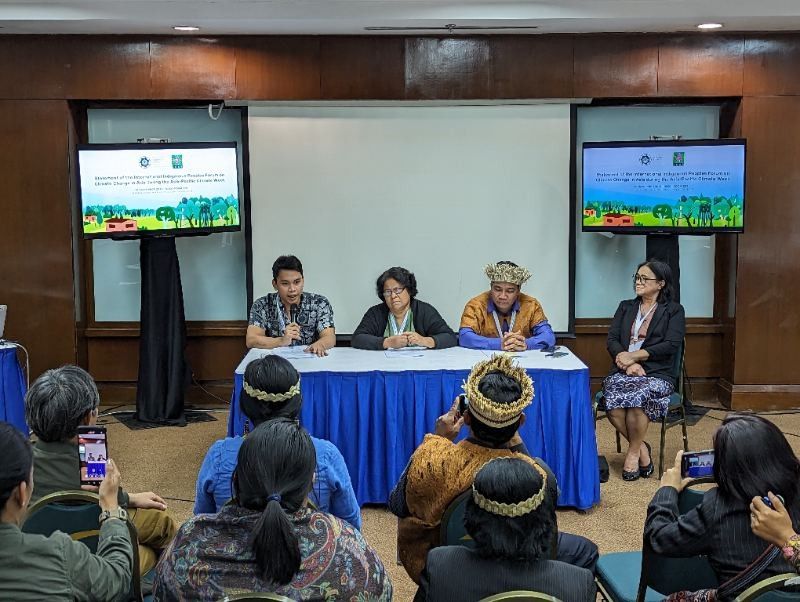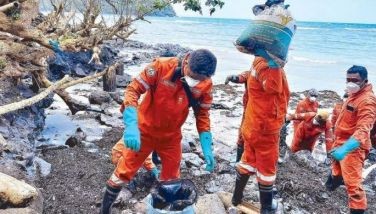Asian indigenous peoples seek greater participation, respect in climate fight

JOHOR BAHRU, Malaysia — Respecting the rights of indigenous peoples and enhancing their participation in climate change processes play a crucial role in addressing climate change, indigenous representatives from Asia stressed Thursday.
Indigenous peoples, who have long been marginalized in climate discussions and excluded in decision-making processes, safeguard 80% of the world’s biodiversity and hold many of the solutions to the climate crisis.
The International Indigenous Peoples Forum on Climate, representing indigenous peoples at the Asia Pacific Climate Week 2023 in Johor Bahru, Malaysia, emphasized that indigenous peoples should be treated as “key partners” in climate change dialogue, not merely beneficiaries.
Their rich knowledge and experiences should also be integrated into climate strategies
Despite constituting less than 5% of the global population, indigenous peoples are widely regarded as the best stewards of nature.
“All climate decisions and actions must take into account priorities and needs of indigenous peoples, giving special emphasis on the experience of indigenous women, indigenous youth and children, persons with disabilities, and our gender-diverse relatives,” the IIFPCC said in a statement.
“The contributions of our traditional knowledge in adaptation, mitigation and even in responding to loss and damage must be recognized and supported,” the organization added.
Taking up space
According to Asian indigenous peoples, they continue to face systemic disadvantages in advancing their advocacies in international conferences like the APCW.
Aside from the substantial costs associated with travel and participation, the lack of language interpretation options and the use of complex jargons and acronyms limit the participation of many indigenous representatives in the regional summit.
Indigenous peoples attending APCW noted that the challenges faced by their communities were only highlighted in indigenous-led events. During the opening ceremony of the regional climate week Monday, only one speaker—from the United Nations Development Programme—mentioned indigenous peoples.
“In our minds, it’s not just about inclusion, but how we can incorporate active participation within the inclusion so that we can truly express our concerns,” a Dumagat-Remontado youth who goes by the nickname Boniknik told Philstar.com on the sidelines of the APCW.
Asami Segundo, a youth member of the Ikalahan-Kalanguya indigenous community, stressed that the local experiences of indigenous peoples in climate mitigation and adaptation must be heard and amplified.
“Listening to indigenous peoples in these spaces is really vital because whatever happens here will also affect those on the ground,” she told Philstar.com.
One of the calls of IIFPCC is the capacity strengthening of both indigenous peoples to engage meaningfully in negotiation spaces, and of the governments and other partner agencies to understand the plight and rights of indigenous communities.
Calls of indigenous peoples
The IIPFCC demanded that the discussion for funds for loss and damage from climate change impacts should ensure the full participation of indigenous peoples and operationalize a program for direct access financing. Debates over the fundamentals of the loss and damage fund are expected to take center stage in the COP28 climate talks in Dubai later this month.
Asian indigenous peoples said that negotiations on the Global Goal on Adaptation must ethically and equitable involve indigenous knowledge and sciences to prevent maladaptation—or when climate change adaptation efforts backfire and achieve the opposite of the intended effects—and violation of their rights.
They also urged governments to ensure that the transition to clean energy does not recreate the removal, dispossession, and criminalization that indigenous peoples have faced in the current energy system.
“The growing demand for clean technologies is fueling increased extraction of critical minerals, compounding already existing threats that indigenous peoples face in their territories,” the IIPFCC said.
“This approach to decarbonization is creating a new form of climate change threat, as it encourages extractivism which destroys biodiversity and adversely impacts Indigenous Peoples lives and livelihoods,” it added.
The indigenous peoples also called for a moratorium on all carbon trading activities—which they call “another form of colonization”—in the region until their rights to their lands and resources are fully recognized and respected.
The IIPFCC also urged governments in Asia and the Pacific to protect all environmental, human and indigenous rights defenders who are targeted and criminalized for fighting for their rights to their lands and resources, as well as a review of initiatives purported as climate solutions.
The Philippines has been consistently identified as the deadliest country in Asia for individuals defending their land in the environment by watchdog Global Witness.
The outcomes of the APCW, which ends Friday, will feed into the crucial COP28 climate talks in Dubai, building momentum for progress on issues such as energy transition, climate finance, and loss and damage.
APCW 2023 will also contribute to the “global stocktake” of the world’s progress in achieving the goal of the 2015 Paris Agreement of limiting global warming to 1.5 degrees Celsius.
READ: From Johor Bahru to COP28: Why Asia Pacific Climate Week matters
--
This story was supported by Climate Tracker Asia.
- Latest





























